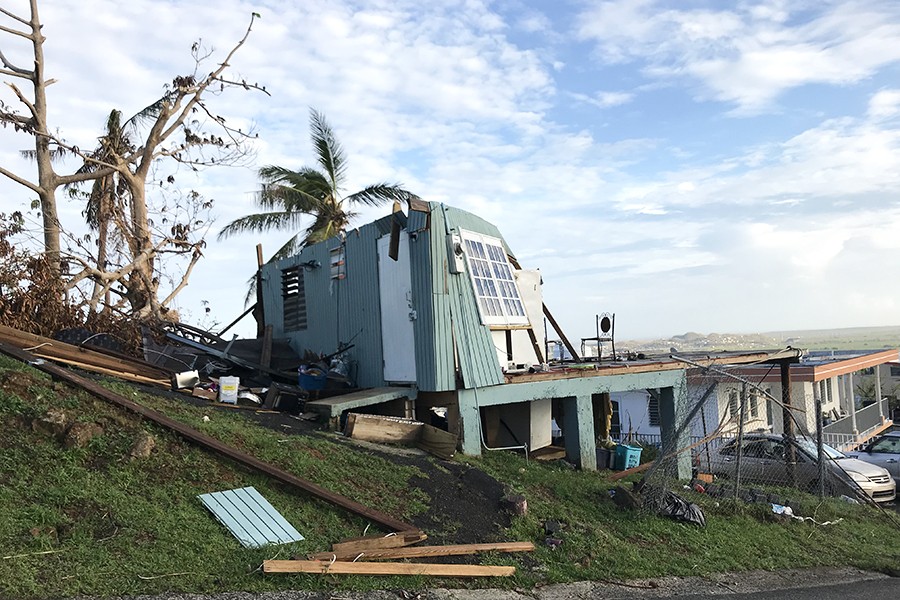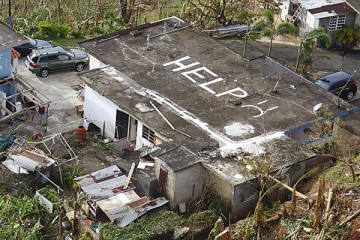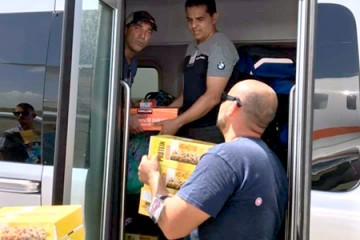It has been nearly two months since Hurricane María wreaked havoc on my beautiful homeland, Puerto Rico, and the island I returned to four weeks ago is not the Puerto Rico I know. It felt incredibly foreign: a hot, humid, shadeless place that needs ample amounts of love and attention.
Trees were bare and the breeze no longer lingered through their leaves and branches. The heat was intense and, in a place once known for its lush greenery, it was difficult to escape direct sunlight. Places that never have been prone to flooding were suffering from flash floods due to copious amounts of debris and garbage that has yet to be collected.
No matter how much people smiled and went out for a few hours to have a drink and alleviate their stress, there was a collective sense of sadness and anxiety in the air. People are desperately looking for normalcy in a situation that is anything but normal.
I travelled to the island to visit family and deliver supplies to hard-hit areas. These were mainly delivered to Naranjito, a municipality in the mountainous center of the island. The drive there was full of surprises that could easily be dismissed by someone not familiar with the island. For example, Puerto Ricans are used to seeing people sell delicious fruit or handmade hammocks on the side of the roads. But all I saw were washboards and oil for gas-operated power generators.
Once in Naranjito, we arrived to Sector Bernard, a remote mountaintop community where we were greeted with smiles and open arms. We visited approximately 15 families, half of which were residing with a neighbor because they lost everything in their own homes. Anywhere you looked, every other house was missing a roof, or a room, or both.
We heard story after story of María's wrath: a couple having to use their bodies as shields to unsuccessfully prevent their door from collapsing, screams from children fearful for their lives and huddled in a bathroom, neighbors linking arms to help someone stuck underneath a storm shutter. There were at least three cars María dragged around the mountaintop and destroyed.
After the storm, there was a dire need for solar lanterns, flashlights, and accompanying batteries. I met a couple who told us we arrived "just in time," as they were on their last two candles.
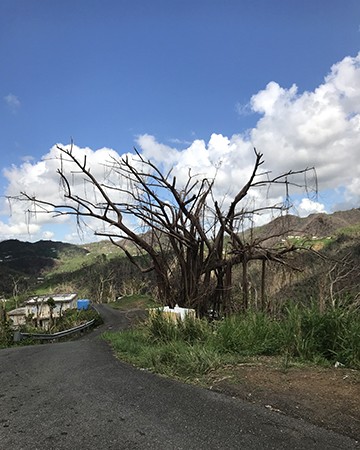
Image caption: A leafless tree in Sector Bernard in Naranjito, Puerto Rico
Image credit: Yonaira Rivera
Residents also requested water. Like many Puerto Ricans living in the mountains, residents of Sector Bernard use mountain springs as their main source of water. As we drove up the mountain, we saw families collecting water downstream, which is problematic given increases in cases of leptospirosis and other bacterial diseases. In lieu of bottled water, we brought several water filtration systems and handed them out. We also brought water purification drops and taught them how to correctly use Clorox and boil water before consuming.
The most challenging part was explaining why drinking mountain spring water without such treatments is now a public health hazard; many residents have consumed mountain spring water throughout their lives, and they could not comprehend how this was now a vessel for disease.
The most incredible thing was that 23 days after the storm, not one government entity had come to Sector Bernard. Not federal, not state, not local. There had been no trace of assistance. Not one tarp delivered. Not one assessment made. Not one box of food or water. Nothing. Local residents were actually driving their own garbage down to the city, because there had been no garbage collection since the storm.
Yet, in spite of being forgotten, residents of Sector Bernard were not bitter. They were incredibly resilient. Their gratitude was palpable, and even though they have been forced into an unfortunate reality, they were helping one another through it all. In fact, they asked us to please return this Christmas, because they wanted to thank us by having lechón asado, a staple pork dish during the holiday season on the island.
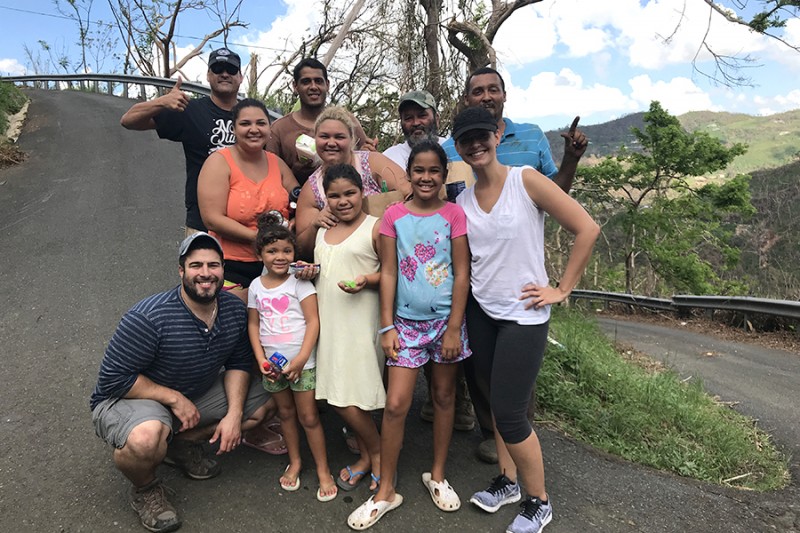
Image caption: Residents of Sector Bernard in Naranjito alongside members of the team that delivered assistance.
Image credit: Yonaira Rivera
There are some places that have received vast media attention, and therefore a spike in humanitarian aid. Assisting areas with stark images of devastation has become necessary in the face of the hurricane's aftermath, but it is not a sufficient response. Just because you do not see a picture of a collapsed bridge does not mean an area has not been hit hard. This has been the case with Naranjito. What did people need the most? Sunblock. Bug spray. Tarps. Water filtration systems. AAA and D batteries. Solar lanterns. Food. Water. Hygiene products. Hugs—lots of hugs. And hope.
While 55 days have passed since the storm, the realities are still bleak: to date, there are discrepancies in total hurricane-related deaths reported; at least 27 reported suicides; 121 cases of leptospirosis; more than 25% of people lack running water, and more than 70% still lack power. Areas in San Juan still flood after rainfall. FEMA just recently began to deliver tarps to homes that have had structural damage, and supply distribution is still stagnant.
There are many people and entities helping in Puerto Rico, but it's not enough. This is going to take a collective effort, spanning from federal, state, and local governments; to the private and public sectors; to community organizations and private citizens. That is why several of us are spearheading efforts to work with a local community through the Maryland chapter of Puerto Rico Rising.
In the upcoming months we will be collecting donations to deliver medical, mental, and public health assistance, as well as partnering with community leaders to assist in capacity-building and long-term renovations. We will also be promoting local events to raise awareness and developing new technologies to assist with telecommunications. This is just one way you can assist in making Puerto Rico stronger than ever.
As we were told by a group of federal workers that had been stationed in Puerto Rico for the previous three weeks, this is the worst they have ever seen. These are people who provided relief in Texas after Hurricane Harvey and in Florida after Hurricane Irma. Their faces said it all. This is a humanitarian disaster. Plain and simple.
Yonaira M. Rivera is a public health practitioner and PhD candidate at the Johns Hopkins Bloomberg School of Public Health. She is also one of the founding members of Puerto Rico Rising–Maryland.
Posted in Voices+Opinion
Tagged puerto rico




